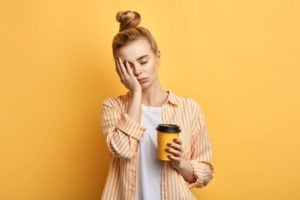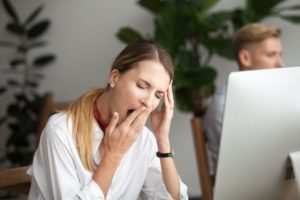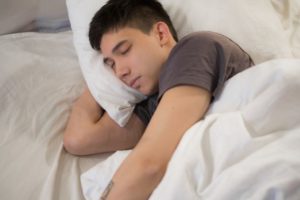When you buy through our links, we may earn a commission. Products or services may be offered by an affiliated entity. Learn more.
Dysania
Many people enjoy spending a few extra hours in bed on a weekend morning. However, some individuals frequently experience an extreme desire to remain in bed. They may even feel like they cannot get out of bed at all. These feelings and desires may be referred to as dysania, clinomania, or clinophilia.
All three of these terms describe spending excess time in bed but not necessarily sleeping more. Although occasionally lounging in bed may not be a cause for concern, spending too much time in bed may make sleeping at night more difficult. It may also be a symptom of an underlying health condition.
What Is Dysania?
Dysania means an extreme difficulty rising from bed or an inability to leave the bed. Dysania is closely associated with clinomania, which is an obsession with or profound desire for staying in bed. These terms are not widely recognized by the medical community.
Some professionals use the term clinophilia, which refers to an excessive amount of time spent in bed both at night and during the day. Although a person with clinophilia spends more time lying in bed, the amount of time they spend sleeping does not necessarily increase.
Dysania, clinomania, and clinophilia are not standalone disorders themselves but may be symptoms of another condition. However, the use of these terms is inconsistent in the medical community. This means that few published research studies connect these terms to specific medical conditions.
Looking to improve your sleep? Try upgrading your mattress.
Symptoms of Dysania
Dysania is characterized by an overwhelming need to stay in bed. Individuals may experience other symptoms alongside dysania, depending on the underlying cause. Concurrent symptoms may include excessive daytime sleepiness or fatigue.
How Much Time in Bed Is Too Much?
The amount of time an individual needs to spend in bed varies depending on age and health. Sleep experts recommend that the bed only be used for sleeping and sex, and not other activities, in order to improve sleep at night. Since the average adult needs between seven and nine hours of sleep each night, that range may be a good estimate of the time most adults should spend in bed.
Causes of Spending Too Much Time in Bed
Spending excessive time in bed may be a sign of an underlying medical condition, such as depression. Depression is a mood disorder that has many symptoms, including decreased interest in activities or other people, weight changes, trouble sleeping, and fatigue. These symptoms may contribute to a desire to stay in bed and not get up.
Too much time spent in bed can also be a symptom of hypersomnia. Hypersomnia is a disorder of excessive sleepiness that occurs even when a person should be awake. People with hypersomnia experience unrefreshing sleep at night and can fall asleep unintentionally during the daytime.
Other health issues may contribute to extra time spent in bed, though there is limited research on the association. For example, sleep inertia is a state of grogginess upon waking up in the morning that affects cognitive performance. This experience may make getting out of bed a challenge.
Some health conditions may cause extreme tiredness or pain, such as chronic fatigue syndrome and fibromyalgia. People with these conditions tend to have unrefreshing sleep. They may also sleep longer and may spend extra time in bed due to exhaustion.
Health Effects of Excessive Time in Bed
Excess time spent in bed can have consequences on sleep and the body. For instance, spending too much time overall in bed may make it harder to stay asleep at night. Research shows that limiting the amount of time spent in bed can improve sleep for people with insomnia.
If a person does not change positions while lying in bed, they may develop pressure ulcers, also called bed sores. A sedentary lifestyle can also decrease muscle strength, weaken bones, and impact the immune system. Increasing physical activity can improve these outcomes.
Treatments for Excessive Time in Bed
Because excess time spent in bed may be a symptom of an underlying condition, treatment may be aimed at addressing the condition. For example, people with depression may benefit from a combination of psychotherapy and antidepressants.
Also, practicing sleep hygiene can help instill a healthy routine around sleep. Sleep hygiene includes several key components.
- Follow a consistent sleep schedule: Try going to bed and waking up at the same times every day, including on weekends. Aim to get between seven and nine hours of sleep each night.
- Use the bed only for sleep and sex: Avoid activities like working or eating in bed.
- Create a quality sleep environment: The bedroom should be dark, quiet, and kept at a comfortable temperature for sleeping. Accessories such as blackout curtains or white noise machines can help block out unwanted light or sounds.
- Wind down before bedtime: Calming activities such as taking a bath, reading, or meditating can help you relax and feel sleepy before bedtime.
- Get sunlight and exercise during the day: Exposure to sunlight helps regulate the body’s sleep-wake rhythm. Daytime physical activity can make falling asleep easier in the evening.
When to Talk to Your Doctor
If your desire to remain in bed is impacting your health and well-being, talk to your health care provider. Be sure to share other symptoms you may be experiencing, such as depressed mood, excessive daytime sleepiness, or fatigue. Your doctor can evaluate your symptoms and determine an appropriate course of action.

Still have questions? Ask our community!
Join our Sleep Care Community — a trusted hub of product specialists, sleep health professionals, and people just like you. Whether you’re searching for the perfect mattress or need expert sleep advice, we’ve got you covered. Get personalized guidance from the experts who know sleep best.
References
17 Sources
-
Lammers, G. J., Bassetti, C. L., Dolenc-Groselj, L., Jennum, P. J., Kallweit, U., Khatami, R., Lecendreux, M., Manconi, M., Mayer, G., Partinen, M., Plazzi, G., Reading, P. J., Santamaria, J., Sonka, K., & Dauvilliers, Y. (2020). Diagnosis of central disorders of hypersomnolence: A reappraisal by European experts. Sleep Medicine Reviews, 52, 101306.
https://pubmed.ncbi.nlm.nih.gov/32311642/ -
Aran, A., Mignot, E., & Arnulf, I. (2021, November 2). Kleine-Levin syndrome (recurrent hypersomnia). In T. E. Scammell & R. D. Chevrin (Eds.). UpToDate., Retrieved June 17, 2022, from
https://www.uptodate.com/contents/kleine-levin-syndrome-recurrent-hypersomnia -
American Academy of Sleep Medicine. (2014). The International Classification of Sleep Disorders – Third Edition (ICSD-3). Darien, IL.
https://aasm.org/ -
Léger, D., Beck, F., Richard, J. B., Sauvet, F., & Faraut, B. (2014). The risks of sleeping “Too much”. Survey of a national representative sample of 24671 adults (INPES health barometer). PLoS ONE, 9(9), e106950.
https://pubmed.ncbi.nlm.nih.gov/25226585/ -
Chervin, R. D. (2021, September 29). Approach to the patient with excessive daytime sleepiness. In T. E. Scammell (Ed.). UpToDate., Retrieved June 17, 2022, from
https://www.uptodate.com/contents/approach-to-the-patient-with-excessive-daytime-sleepiness -
Lyness, Jeffrey. M. (2021, February 19). Unipolar depression in adults: Clinical features. In P. P. Roy-Byrne (Ed.). UpToDate., Retrieved June 17, 2022, from
https://www.uptodate.com/contents/unipolar-depression-in-adults-clinical-features -
Besedovsky, L., Lange, T., & Haack, M. (2019). The sleep-immune crosstalk in health and disease. Physiological Reviews, 99(3), 1325–1380.
https://journals.physiology.org/doi/full/10.1152/physrev.00010.2018 -
Trotti, L. M. (2017). Waking up is the hardest thing I do all day: Sleep inertia and sleep drunkenness. Sleep Medicine Reviews, 35, 76–84.
https://pubmed.ncbi.nlm.nih.gov/27692973/ -
Gluckman, S. (2022, May 9). Clinical features and diagnosis of myalgic encephalomyelitis/chronic fatigue syndrome. In A. L. Kamaroff (Ed.). UpToDate., Retrieved June 17, 2022, from
https://www.uptodate.com/contents/clinical-features-and-diagnosis-of-myalgic-encephalomyelitis-chronic-fatigue-syndrome -
Goldenburg, D. L. (2022, April 28). Clinical manifestations and diagnosis of fibromyalgia in adults. In P. H. Schur (Ed.). UpToDate., Retrieved June 17, 2022, from
https://www.uptodate.com/contents/clinical-manifestations-and-diagnosis-of-fibromyalgia-in-adults -
Martin, J. L. (2021, December 3). Cognitive behavioral therapy for insomnia in adults. In R. Benca (Ed.). UpToDate.
https://www.uptodate.com/contents/cognitive-behavioral-therapy-for-insomnia-in-adults -
Maurer, L. F., Espie, C. A., Omlin, X., Reid, M. J., Sharman, R., Gavriloff, D., Emsley, R., & Kyle, S. D. (2020). Isolating the role of time in bed restriction in the treatment of insomnia: A randomized, controlled, dismantling trial comparing sleep restriction therapy with time in bed regularization. Sleep, 43(11).
https://pubmed.ncbi.nlm.nih.gov/32421814/ -
MedlinePlus: National Library of Medicine (US). (2016, May 2). Pressure sores., Retrieved June 17, 2022, from
https://medlineplus.gov/pressuresores.html -
MedlinePlus: National Library of Medicine (US). (2017, June 27). Health risks of an inactive lifestyle., Retrieved June 17, 2022, from
https://medlineplus.gov/healthrisksofaninactivelifestyle.html -
Rush, A. J. (2020, November 18). Unipolar major depression in adults: Choosing initial treatment. In P. P. Roy-Byrne (Ed.). UpToDate., Retrieved June 17, 2022, from
https://www.uptodate.com/contents/unipolar-major-depression-in-adults-choosing-initial-treatment -
National Heart, Lung, and Blood Institute. (2011, August). Your guide to healthy sleep., Retrieved June 17, 2022, from
https://www.nhlbi.nih.gov/health-topics/all-publications-and-resources/your-guide-healthy-sleep -
National Center for Chronic Disease Prevention and Health Promotion, Division of Population Health. (2016, July 15). Tips for better sleep. Centers for Disease Control and Prevention., Retrieved June 17, 2022, from
https://blogs.cdc.gov/niosh-science-blog/2020/06/29/sleep-hwd/









